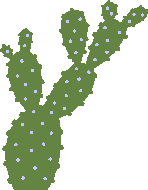 November Gardening Ideas - November 21, 2001 Jeff Schalau, County Director, Agent, Agriculture & Natural Resources Arizona Cooperative Extension, Yavapai County This week I'm doing something I've never done before: writing one of those columns that tell you what you should be doing in your garden this month. Well, this column is for those people that have told me I always put too much technical information in and never write about "gardening". Who knows, this may be the beginning of a new trend. So, lets talk about some things that we should be doing as well as some things that should not be done. First of all, we should be getting some hard freezes soon. So we can either give up our warm season vegetables or protect them for a little longer. My garden in Prescott still has tomatoes and chiles ripening on the plants. These and other warm season crops can be covered at night to protect them. I have a past column on frost protection (December 22, 1999) available on the Backyard Gardener Web Site. When the plants die, rip them out and consider planting a cool season cover crop such as clover, vetch, or rye. You could also plant a cool season vegetable crop, seed wildflowers, or plant winter annuals such as pansies. Check out your garden for insect or disease damage you may have overlooked during the growing season. Once leaves fall off deciduous trees, you can see the trunk and branches. Aphids and scale may be hiding in your trees and shrubs. Pick up rotten fruit (mummies) and treat deciduous fruit trees with dormant oil to reduce pest populations. You may also notice some broken branches or diseased areas of your woody plants. These can be pruned out. However, soak your tools in isopropyl alcohol after working on diseased plants. I don't recommend overseeding bermudagrass lawns with cool season grasses such as rye. At our elevation, this put undue stress on the bermudagrass and may be difficult to get rid of later on. Instead, enjoy a few months of brown turf and little or no mowing. If you have cool season turf, such as Kentucky bluegrass or tall fescue, then you need to fertilize it with nitrogen. An application of 1 lb N/1,000 sq ft is adequate. Remember that fertilizers are not 100% nitrogen. This rate would equal about 5 lbs ammonium sulfate/ 1,000 sq ft or 3 lbs ammonium nitrate/1,000 sq ft. Do not prune your fruit trees or rose bushes yet. Wait until February or March just in case we get a hard freeze. If you prune now, a hard freeze could cause damage to the remaining wood. By waiting, you will have more pruning options if we do get a hard freeze. This is a good time to plant evergreens. Pines, junipers, and cedars photosynthesize year-round and will initiate root growth in the fall and winter. Once planted, make sure you irrigate evergreens adequately during the winter months. Deciduous woody plants need some water during the winter too. Conversely, take care not to over irrigate. If you have an automated irrigation system, cut back the schedule if you have not done so since summer. Pick off the spent blooms on flowering shrubs and perennials. This cleans up the plant and can stimulate new growth on the cool season growers. Pine trees will also be dropping needles this time of year. Don't worry: this is normal. Most pine trees retain their needles for three years. If this advice bores you or sounds too much like work, then patronize your local nursery and pick some plants, clean up and sharpen your tools, or ponder the meaning of the universe. You should also check out our recently updated publication: Natural Resources of Yavapai County. It's available on our web site (http://ag.arizona.edu/yavapai/) or by request from our county offices. The University of Arizona Cooperative Extension has publications and information on gardening and pest control. If you have other gardening questions, call the Master Gardener line in the Cottonwood office at 646-9113 or E-mail us at mgardener@verdeonline.com and be sure to include your address and phone number. Find past Backyard Gardener columns or submit column ideas at the Backyard Gardener web site: http://ag.arizona.edu/yavapai/anr/hort/byg/. |